‘No possible life’ under Taliban rule: Afghan women fear murder, oppression after US withdrawal

KABUL – College professor Moqadasa Rasouli has many memories from when the Taliban ruled the majority of Afghanistan and enforced a strict interpretation of sharia or Islamic law.
These memories are invariably the stuff of nightmares.
Once, Rasouli witnessed a group of women being severely whipped for wearing flip-flops and nail polish. Another time, her 10-year-old neighbor was beaten for forgetting to put on a headscarf. When the Taliban found out Rasouli and other girls were secretly studying at a school, it was promptly closed down.
"Afghan women don't want the dark era of the Taliban to be repeated," said Rasouli, 31, referring to when the Islamic fundamentalist group controlled Afghanistan from 1996 until the U.S.-led invasion in 2001.
But many fear that it could materialize. President Joe Biden says the U.S. will complete withdrawal from Afghanistan by Aug. 31, ending America's 20-year war. Meanwhile, the security situation worsens.
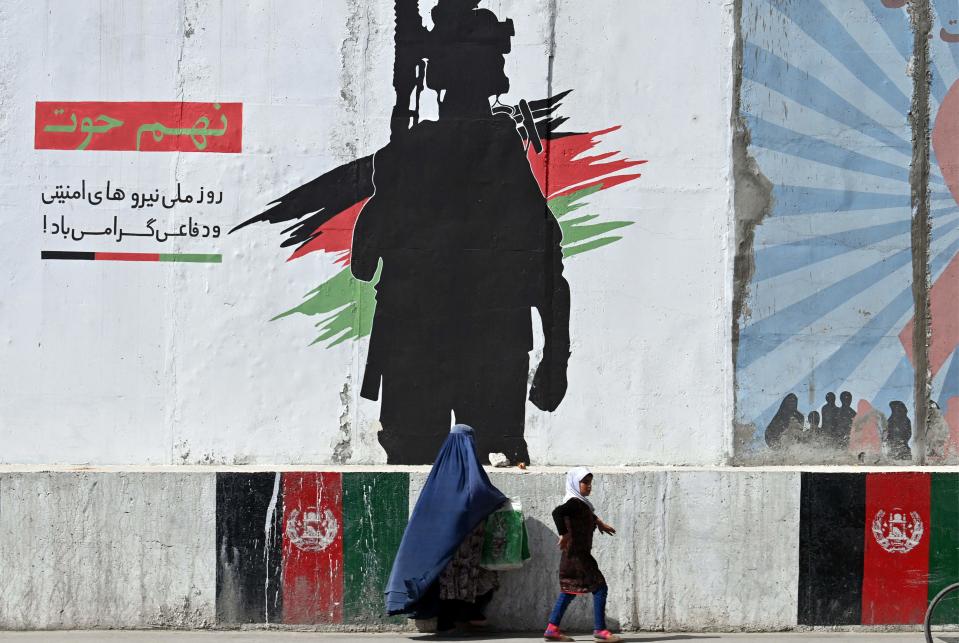
Gains made
The U.S. invasion was aimed at ousting the Taliban from power, which it did, because it had given sanctuary to Osama Bin Laden and the al-Qaeda terror network that carried out the 9/11 attacks.
The invasion was not expressly intended to relieve the suffering of women and girls from a regime that perpetrated discrimination and violence, including killings, rape, abduction and forced marriage.
The Taliban barred girls from attending school and prohibited women from working outside the home. Appearing in public without a male relative was illegal. Religious and ethnic minorities were relentlessly targeted by the Taliban.
Since the end of the Taliban's rule, its fighters and like-minded insurgents have continued near daily attacks and bombings. In early May, at least 85 people were killed, many of them young female students, when a school for girls was bombed in Kabul.
Yet progress also has been made over the last two decades. About 3.5 million of the 9 million Afghans enrolled in school are female, according to a recently declassified U.S. Office of the Director of National Intelligence document.
The number of schools rose more than tenfold after 2001, according to the declassified memo. In 2003, fewer than 10% of Afghan girls were enrolled in schools, according to Afghanistan country reports by the World Health Organization and World Bank. By 2017, that number had grown to 33%, although many schools have been shuttered in recent years by rising insecurity.
There are female police officers, politicians and cultural figures. Women occupy prominent places in civil society.
By 2020, 21% of Afghan civil servants were women, compared to almost none during the Taliban years. Women’s life expectancy grew from 56 years in 2001 to 66 years in 2017. Mortality during childbirth declined from 1,100 per 100,000 live births in 2000 to 396 per 100,000 in 2015.
'I ... will either be stoned to death or executed in a public space'
But as the Biden administration has started withdrawing all remaining U.S. troops from Afghanistan, many Afghan women feel deeply threatened by the prospect of Afghanistan's next chapter.
USA TODAY spoke to a large group of young girls who recently fled Ghazni province, in southeastern Afghanistan, because they feared they would be kidnapped or rounded up by Taliban fighters and forced into marriages. Ghazni province is on the verge of falling to the Taliban.
"I see no possible life for me in Afghanistan with the Taliban in control," said Wazhma Sahel , 22, a military officer who works as a criminal investigator in the Kabul police department.

Sahel, like most of the Afghan women USA TODAY spoke to for this story, requested the use of a pseudonym for personal safety and security reasons. Sahel said that in addition to regular threats she receives on social media, the Taliban has started sending written death threats to the office where she works.
"If the Taliban returns to power, I along with other women who work in the government's military and security forces will either be stoned to death or executed in a public space in front of a crowd," she said.
PODCAST: What to know about U.S. withdrawal from Afghanistan
It is a real threat. The Taliban and its allies have targeted professional women at an alarming rate in recent years.
Police officer Fatima Rajabi, who worked in a special anti-narcotics division, died age 23 in July 2020 after the Taliban stopped the vehicle she was traveling home in and took her captive.
Rajabi's remains, which had gunshot wounds and signs of torture, were sent to her family.
In June 2020, Fatima Natasha Khalil, an official with the Afghanistan Independent Human Rights Commission, was killed by a roadside explosive device planted by the Taliban in Kabul.
Khalil was on her way to her office when she was killed. She was 24.
In May that same year, Maryam Noorzad, a midwife, was murdered in a Kabul hospital after three Taliban gunmen attacked the maternity ward. Noorzad refused to leave her patient, who was in labor.
Noorzad, her patient and the newborn baby were all killed in the delivery suite.
Malala Maiwand was assassinated along with her driver on December 2020 in Jalalabad, a regional city in the eastern part of Afghanistan.
"She was a smart and kind-hearted girl," said Mohammad Bilal of his sister.
Maiwand, a radio and TV reporter, was on her way to work when she was killed by a suspected Taliban gunman. She was 26. Maiwand was not the first member of her family to die in an attack by a Taliban militant. Five years earlier, her mother, a social worker who publicly advocated for women's rights, also was assassinated by the Taliban.
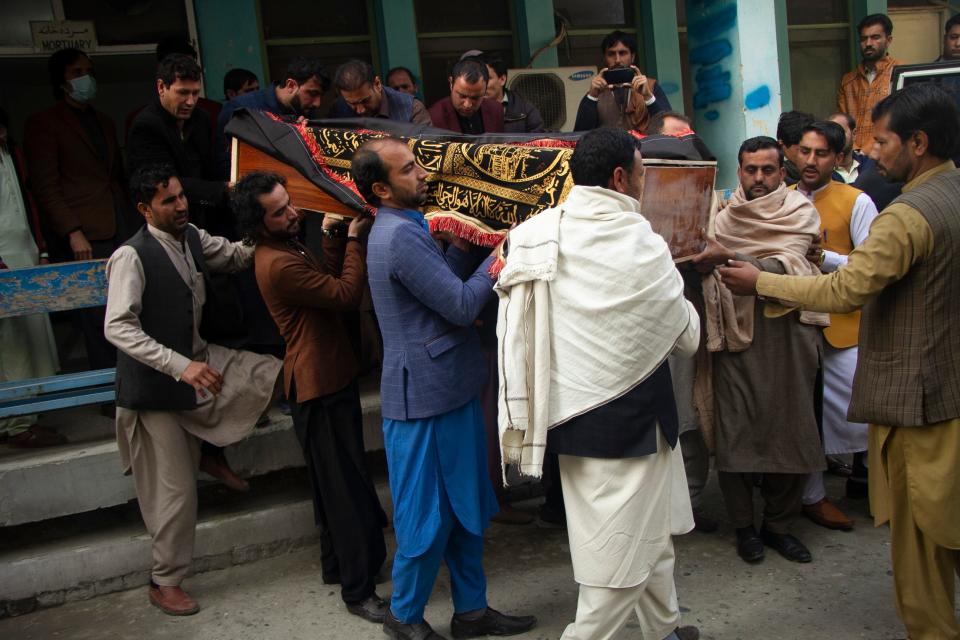
Shortly after Maiwand's killing, three other Afghan journalists, all women, were killed by suspected Taliban militants. And on the heels of those attacks, three women involved in administering the government's polio vaccine campaign were murdered by suspected Taliban insurgents. The women, all in their 20s, were killed as they were about to enter a house to vaccinate children who lived there.
"Women in Jalalabad are now afraid to get their education, to walk in public and to travel to work," said Bilal. "The security situation for women in particular is getting worse."
Taliban unrelenting
The Taliban is not yet formally running Afghanistan.
But all the indications are that it could soon be.
In recent days, ferocious street fighting between the Taliban and Afghan government forces erupted in Lashkar Gah, a city in southern Helmand province that could become the first major provincial capital to fall to the Taliban.
The Taliban claimed responsibility this week for a suicide attack targeting the home of Afghanistan’s defense minister that killed eight people and wounded 20 more.
The U.S. had withdrawn more than 90% of its troops and equipment by July, the Pentagon's Central Command said, while the Taliban is continuing to take territory from the western-backed Afghan government in Kabul. In fact, the Taliban is in a stronger position militarily than at any point since 2001, according to a March report by the U.S. Congressional Research Service.
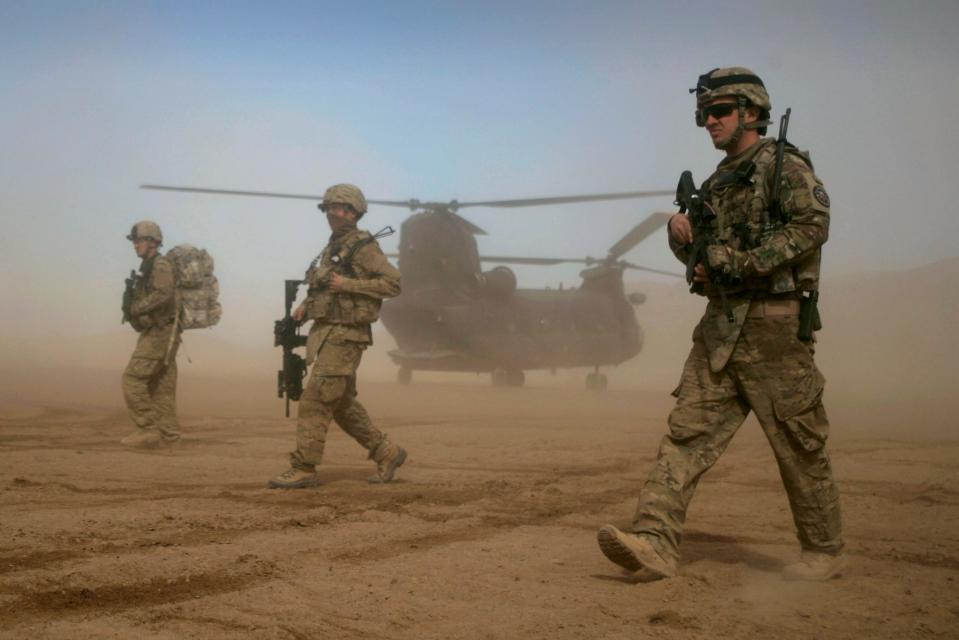
"This is a calendar-based withdrawal by the U.S., it's not conditions-based," said Colin P. Clarke, the director of research and policy at The Soufan Group, a security-focused think thank.
"If we're waiting for a conditions-based withdrawal we may be waiting for another 20 years," added Clarke, referring to concerns the U.S. is leaving the country at a time when not only is the Taliban generating momentum military but its ties to al-Qaeda and its affiliates have not been fully severed.
Clarke said the withdrawal could create conditions that allow networks of foreign terrorists to thrive in Afghanistan as they did in Iraq when the U.S. withdrew from that country in 2011, leaving a void that contributed to the creation of the Islamic State terrorist group.
Gains erased
Sen. Jeanne Shaheen, D-N.H., a member of the Senate Foreign Relations Committee, is opposed to the U.S. withdrawal in its current form – partly because of the possibility it could lead to the Taliban giving shelter to extremist groups who pose a terrorism threat to the U.S.
She also has raised concerns about the preservation of rights for Afghan women and girls.
"One of the things we know is those societies that empower women tend to be more stable," Shaheen said.
During a recent Senate Foreign Relations Committee hearing about the need to protect gains made by Afghan women, Shaheen highlighted the cases of seven women who were murdered by the Taliban.
"They reflect, I think, thousands of other women in Afghanistan who have been the targets of violence. We can call them courageous and certainly we do. But they shouldn't have to be courageous (for going about their daily lives)," Shaheen told her fellow lawmakers and Ambassador Zalmay Khalilzad, the U.S. Special Representative for Afghanistan Reconciliation.
Among the names she mentioned were Maiwand's, the journalist killed in Jalalabad; Khalil's, the human rights activist who was murdered in Kabul; and Freshta Mohamed, a 35-year-old prison guard who was killed by a a suspected Taliban gunman in October 2020 as she made her way to work in a taxi.
Nishank Motwani, deputy director of the Afghanistan Research and Evaluation Unit think tank in Kabul, said that it's all but a given that women's gains since the Taliban's ouster will be rolled back once the U.S. and NATO troops pull out of Afghanistan entirely.
"It's a question of when, not if," he said. "These gains are completely reliant on the engagement of foreign forces on the ground."
Taliban unchanged
The Taliban's official public position is that it is committed to the basic rights of women.
"We are not going to dismantle educational institutions or impose restrictions on women working if they observe the Islamic veil code," Suhail Shaheen, a senior member of the Taliban team negotiating a fledgling peace deal with the U.S.-backed Afghan government, told USA TODAY.
"Unfortunately, we are victims of maligning and propaganda of our opponents. This has created a wrong image of (the Taliban) in Western media but it is not our true image."
However, rank and file Taliban militants are more direct.
"We will kill those who prevent us from reaching our Holy visions," said Haji Mulawi Mazlumiar, a militant who is fighting Afghan government forces in Ghor province, in central Afghanistan. "It doesn't matter if the enemy is a foreigner, from the security forces or our own family member."
There's "absolutely not one shred of evidence to suggest the Taliban is more benign in their ways or outlooks" compared to prior to the U.S. invasion of Afghanistan, Motwani said.
Districts currently controlled by the Taliban "are exactly how they were when the Taliban was in power in Afghanistan in the 1990s: Women can't go to school. They can't go outside to buy medicine without a male chaperone. They are watched. It's that climate of fear," he said.
Even after years of international investment and focus on the issue of women's rights Afghanistan still ranks at or near the bottom of multiple global indices that track the conditions for women and girls.
A United Nations study in 2019 found that only 15% of Afghan men think women should work outside the home after marriage, and two-thirds complained that women have too many rights. Afghan women have less access than men to capital, struggle to own property, and as of 2017 approximately 16% of working-age women were employed –compared to 41% of men, according to the recently declassified U.S. Office of the Director of National Intelligence memorandum on threats facing Afghanistan.
Progress is also concentrated in urban areas, while roughly 70% of Afghans live rurally.
"In some rural Pashtun areas, tribal codes that predate the Taliban require women’s full-body covering or seclusion in their homes as a means of protecting their perceived virtue and their families’ honor," the declassified memorandum notes. "Nationwide, child marriage and stoning for adultery persist, and rape victims are killed by relatives for shaming their families."
Motwani said that it's important for foreigners to understand that "nobody handed the recent gains in rights and representation to Afghan women."
He said they actively fought for and campaigned for meaningful roles and participation in public domains and civil society, in private industry, and the military and elected office in a male-dominated culture that has violently suppressed and silenced women for decades.
"The Taliban is one example of that," he said.
Staying, even when ‘I feel like it’s the last day of my life’
Halema Wali, an American-born woman of Afghan descent who lives in New Jersey, said that friends and family who she has checked in with recently in Afghanistan have started making plans to leave.
"There's a bit of panic. Those that have the means are looking for ways to get out. But Afghanistan is a country of widespread poverty so most aren't going to be able to go anywhere," she said.
Visas also are hard to come by, especially to the U.S., even though the Biden administration has agreed to relocate thousands of Afghans who worked with the U.S. military as interpreters and translators while their visa applications are vetted.
Yet even as the threat from an emboldened Taliban looms, many Afghan women refuse to relinquish hard-won gains even in the face of threats.
SUBSCRIBE: Help support quality journalism like this.
"I have never migrated to another country because of the Taliban and never will," said Shahla Farid, a college professor and women's rights activist who insisted USA TODAY publish her real name.
"I don’t want my daughters to be restricted and forced to give up on their dreams as I did once, during the days of the previous Taliban regime," she said, noting that in order for Afghanistan to achieve a true peace women need to be better represented in peace negotiations with the Taliban.
"We don't want to lose our many achievements," said Wakila Karim, 55, a doctor at a state-run-hospital in Fayzabad, a city in northeast Afghanistan's Badakhshan province.
Karim, who also insisted on USA TODAY publishing her real name, said that over the last two decades Badakhshan has reversed its very high mortality rate for new mothers and children because of an influx of female doctors, medicals students and specialist services forbidden during the Taliban.
"I want the world to witness our progress, not the destruction made by the Taliban," she added.
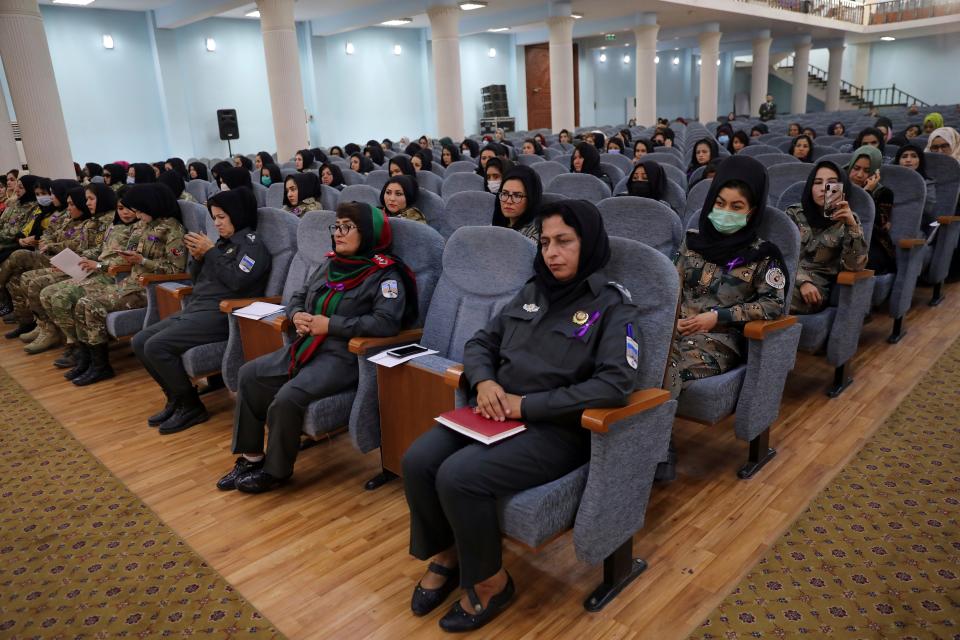
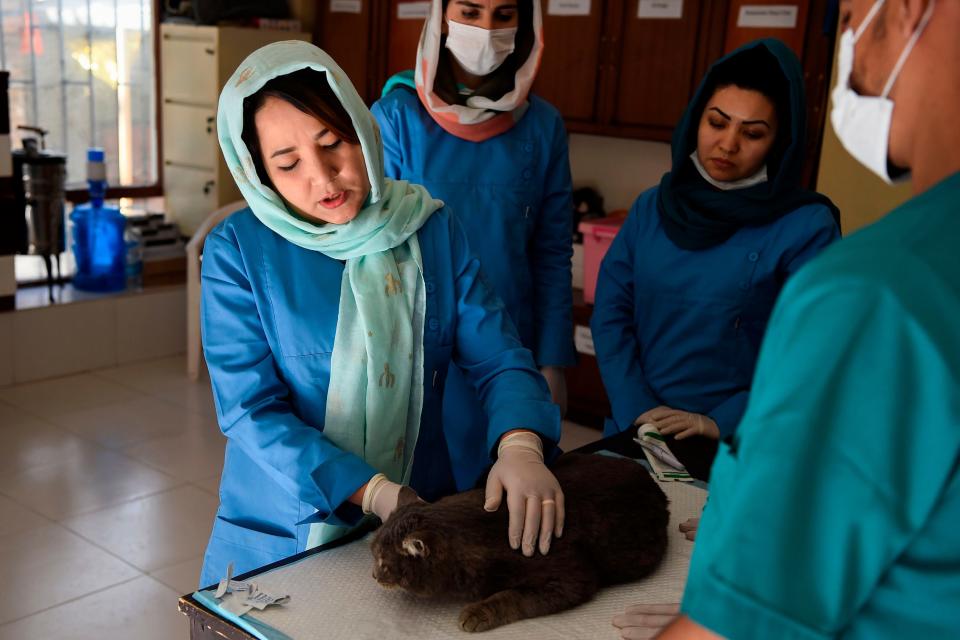
But staying the course isn't easy.
Karim said the security situation in Badakhshan is deteriorating quickly and Taliban fighters have begun stopping, questioning and in some cases beating women in Fayzabad for perceived transgressions.
Karim has so far eluded suspicion. However, she said the increased presence of Taliban fighters and guards on the streets is starting to have an impact on women coming to the hospital for appointments.
Rasouli, the college professor, said that at her university in Helmand province that is mostly controlled by the Taliban, female students and staff are not yet wearing burqas, but the dress code for girls has changed and all are now wearing long body-obscuring dresses and scarves.
"I myself am so afraid that I cannot walk to university in the morning despite the close distance. When I walk out, I feel like it’s the last day of my life and I will be killed," she said.
Others express remarkable defiance.
“Once I am recovered, I will resume my studies to tell them they cannot stop us this way," said Hamida Nawisada, a 16-yr-old survivor of a recent Kabul school attack. "Their way is not right."
This article originally appeared on USA TODAY: Afghanistan withdrawal, Taliban takeover leaves women at constant risk

